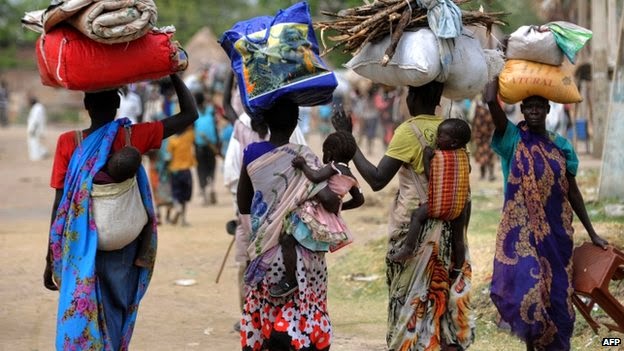South Sudan is made of several dozen ethnic groups. In South Africa, such diversity is a source of pride and celebration, but in Sudan and South Sudan, some wants to kill you for walking while Nuer, Dinka, Chollo, Anyuak, Murle, Zande, Bari, Nyanguara. Can we murder our way to unity? Has our diversity become a liability? At the very base, our communities are humane and good to each other, but the killings of the past four months have been an aberration, a result of manipulation by leaders vying for public office or trying to stay in it. We all seem to know this fact, but why can't South Sudanese act together against the evil of politicalization of ethnic identity? We can't because we are so badly divided that few Dinka would trust a peace call from a Nuer and the reverse is true. So which way South Sudan? Are we condemned to that cycle? Surely that cannot be. Can we restore ethnic cohesion so that we are once again able to relate to one another on the basis of belonging to a single tribe called South Sudan? Without it, we would not be able to engage in a collective citizen action to challenge the leaders into thinking about the country. What would it take for such cohesion to be restored?
It begins with you, the individual. If you can overcome your emotion, revengefulness, avoid the myopic ethnic lens through which you look at national politics, think for a minute before you call for death of your "enemies," stop blaming an entire tribe for the mistakes of leaders who happen to be from that ethnic group, for the poor rural and marginalized ordinary citizens whose death you are calling for are just as victims of bad governance as the members of your own ethnic nation. If you do this, you will quickly notice that your family will follow suit, your friends on the other side will do likewise and forgiveness will catch fire. What would result from this is a realization that the majority poor and excluded lot who are now hacking at each other, at the behest of selfish leaders, have far more in common than they have with these ethnic-minded leaders.
You will also discover that the usual blaming of rural fighters as ignorant and uneducated is actually a description more fitting for the educated folks. Our people had many indigenous ways to wage a responsible war, reconcile with one another when the time is right, spare the lives of women and children, the death ratios were far higher among the fighters and far less among the civilians, the latter of whom were often accidental and not targeted the way it is being done today. Our people had democracy and openness, where a chief could be criticized right to his face by an ordinary person and there was nothing the chief can do, other than actually take this criticism as a way to improve his rule. Women used to challenge the men in the village council, in court and in other ceremonial occasions. It is the "educated" who have now invented ways to exclude the women from decision-making. It is the educated who invented the slaying of women in conflict.
The bottom line, quoting Ayom Wol Dhal, take a few minutes to think about how the victims of this war die, what it must be like for a mere ordinary civilian to beg for his/her life before the bullet goes his/her head. Think about that before you make that call on the internet for his or her death. Think about his or her loved ones and the agony of loss such death would bring upon them. Above all, think about how it could be yourself or your close relatives who might be confronted with that in the course of this war.
Jok Madut Jok is an educator, a heartbroken South Sudanese

No comments:
Post a Comment